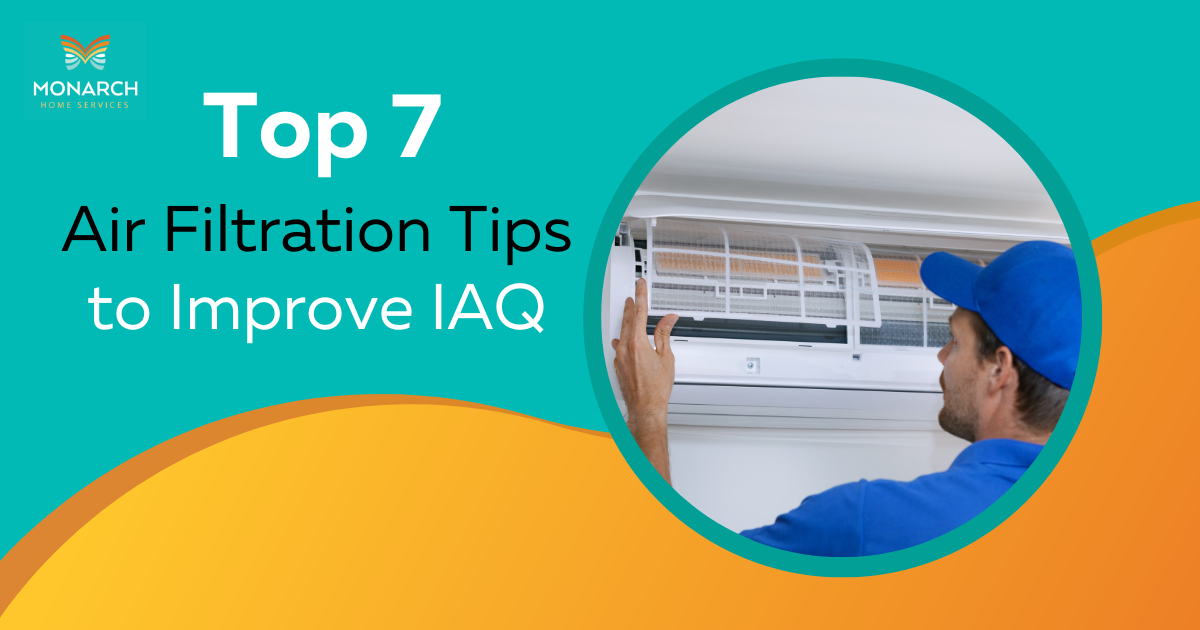
Indoor air quality, or IAQ, affects every San Joaquin Valley household, but we’ll provide a few air filtration tips that can help. Dust, dander, mold, and volatile organic compounds are just a few IAQ concerns. Pollution from traffic and other outside sources can also affect indoor air quality, especially during the warmer months. Here are seven ways you can improve air filtration and your comfort, safety, and well-being:
1. Change the Filter
An HVAC filter should be changed at least once every three months. However, some systems require new filters more frequently. Check with the manufacturer for specific instructions. And if your home is dusty and more prone to IAQ issues, replacing the air filter every month or two is a good idea.
2. Upgrade to a High-Efficiency Particulate Air (HEPA) Filter
A HEPA filter can block nearly all particles as small as 0.3 microns, at least in laboratory conditions. It can filter tiny dust, smoke, and other particles. Some HEPA filters can even capture bacteria and viruses.
3. Run Your HVAC Fan Continuously
If your thermostat allows, switch the fan from “Auto” to “On”. The fan will run even when your AC or heater is off. However, indoor air will still be ventilated and circulated, avoiding stagnant air that can leave behind dust, pollen, and pet dander. Your HVAC fan is therefore an effective air filtration tool.
4. Use the Kitchen and Bathroom Exhaust Fans
Turn on the kitchen exhaust fan when cooking so fumes are vented outside your home. Running the bathroom exhaust fan can ventilate odors and viruses outside and prevent them from concentrating indoors. And when you host visitors, turn on exhaust fans for an hour after they leave to remove any lingering virus particles.
5. Turn on Your Ceiling and Portable Fans
Ceiling fans improve airflow, so they can assist your HVAC system in filtering air. They can also help it feel cooler without turning down the thermostat. Portable fans can also help. To remove particles and viruses, place a fan near an open window to blow air outside, and point it away from people to avoid exposing them to contaminated air.
6. Know How to Use Your Air Purifier
If you use a portable air purifier, leave about 8 inches of space around it, as close to a central spot as possible. Keep it on 24 hours a day to maximize its effectiveness. Close windows and doors to avoid introducing more pollution into your home and forcing the purifier to work harder. And remember to replace the filter and clean the unit as its manufacturer recommends.
7. Know the Right Filter for Your Home
Most forced-air HVAC systems have a standard matted fiberglass filter. It clogs fairly quickly, so it should be changed once a month. Pleated filters have more material and attract pollen and pet dander effectively. Also, they can last two to three months. An extended media filter, which is about 8 inches thick, is installed in the ductwork from where its accordion-like filtration media does its job.
Electronic filters, otherwise known as electrostatic precipitators, also fit into the ductwork. A high-voltage current charges particles in the air that pass through. They are collected by plates at the other end of the filter (an ion filter works similarly but attracts particles to a collection rod). If you’re worried about germs, an ultraviolet (UV) filter destroys bacteria and viruses that pass in front of it.
Monarch Home Services Installs Air Filtration Solutions
We specialize in helping improve IAQ in Central California homes. Airborne particles can be circulated continuously by your HVAC system. Our NATE-/EPA-certified technicians can provide a highly efficient system such as the Air Scrubber Plus, which removes harmful gases and uses UV light to eliminate organic pollutants. To learn about it and other air filtration solutions we offer, call (661) 215-6679 today.

